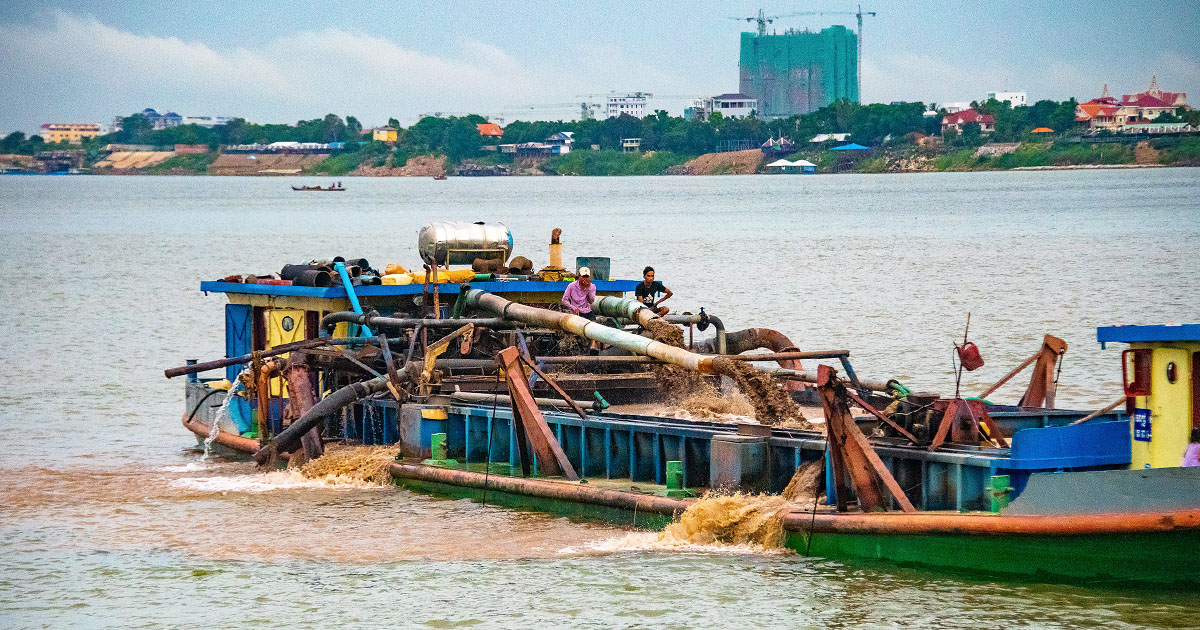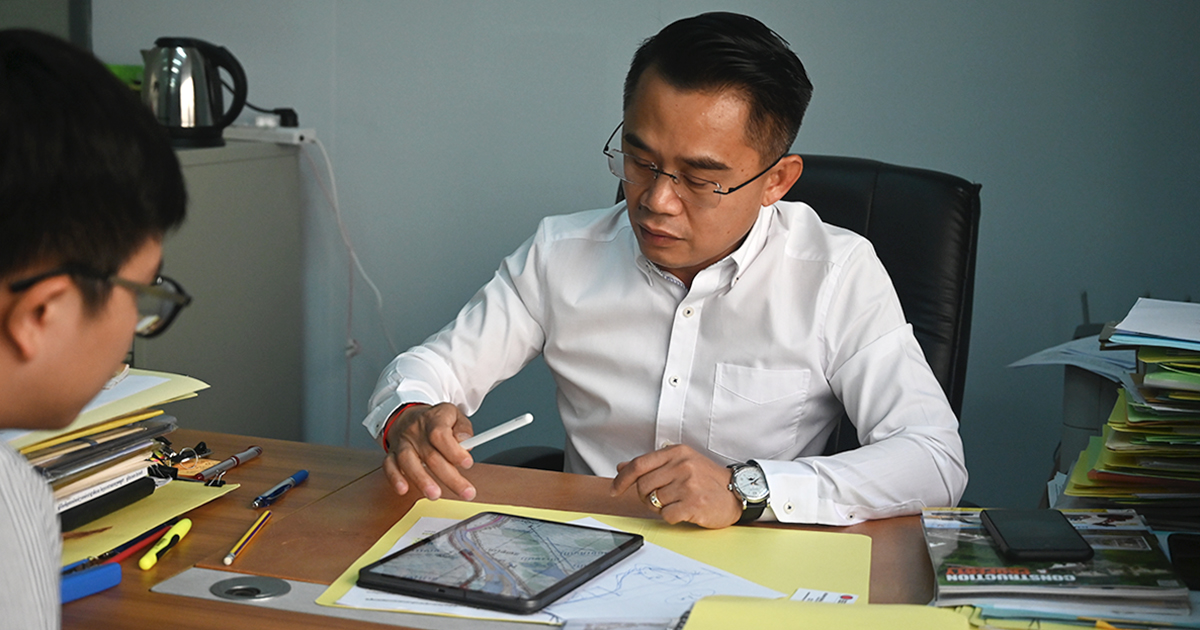ព្រះវិហារកាតូលិកតម្លៃ ៣លានដុល្លារ កំពុងងើបឡើងចេញពីគំនរបែកបាក់នៃរបបខ្មែរក្រហម
ព្រះវិហារកាតូលិក Notre Dame ថ្មីតម្លៃ ៣លានដុល្លារ លាយឡំជាមួយស្ថាបត្យកម្មប្រពៃណីខ្មែរ និងកាតូលិក កំពុងត្រូវបានសាងសង់ឡើងវិញនៅជាយក្រុងភាគខាងជើងនៃរាជធានីភ្នំពេញ ដែលជាគម្រោងសាងសង់ព្រះវិហារកាតូលិកដ៏សំខាន់បំផុតនៅក្នុងប្រទេសកម្ពុជា ចាប់តាំងពីរបបខ្មែរក្រហមបានបំផ្លាញជិតប្រាំទសវត្សរ៍មុន។ ព្រះវិហារកាតូលិកនេះ គ្រោងនឹងបញ្ចប់នៅខែកក្កដា និងសម្ពោធឲ្យប្រើប្រាស់ក្នុងខែវិច្ឆិកា ព្រះវិហារនេះ នឹងត្រូវបានសាងសង់នៅលើមូលដ្ឋានគ្រឹះនៃវិហារ St. Joseph’s បច្ចុប្បន្ន នឹងត្រៀមខ្លួនក្លាយជាមជ្ឈមណ្ឌលថ្មីនៃជីវិតរបស់សាសនិកកាតូលិក នៅក្នុងរាជធានីនៃប្រទេសកម្ពុជា។ គម្រោងនេះ ត្រូវបានរាយការណ៍ដោយ catholicvote.org នៅថ្ងៃទី ១៨ ខែមីនាឆ្នាំ ២០២៥។ ការសាងសង់នេះ ធ្វើឡើងនៅលើទីតាំងប្រវត្តិសាស្ត្រនៃសិក្ខាសាលាចាស់មួយក្នុងទីក្រុងភ្នំពេញ ជាកន្លែងដែលវិហារ St. Joseph’s បានបម្រើសហគមន៍កាតូលិកតាំងពីទសវត្សរ៍ឆ្នាំ ១៩៩០មក។ វិហារថ្មីនេះ បើទោះជាមានទំហំតូចជាងវិហារ Notre Dame ដើមដែលធ្លាប់ផ្ទុកមនុស្សបានដល់ទៅ ១ម៉ឺននាក់ក៏ដោយ នឹងមានកន្លែងអង្គុយចំនួន ៧០០ ជាមួយនឹងបន្ទះឈើប្រពៃណី។ គម្រោងនេះ ត្រូវបានផ្តល់មូលនិធិតាមរយៈសាមគ្គីភាពកាតូលិកឆ្លងព្រំដែន ទាញយកការបរិច្ចាគពីអ្នកស្មោះត្រង់ ក្នុងប្រទេសកម្ពុជា ថៃ និងវៀតណាម រួមជាមួយនឹងការគាំទ្រសំខាន់ៗពីសមាគម បេសកកម្មបរទេសប៉ារីស។ វិហារ Notre Dame ដើមដែលធ្លាប់ត្រូវបានសរសើរថាជាអគារដ៏ស្រស់ស្អាតបំផុតមួយនៅក្នុង […]
កម្ពុជាត្រៀមបង្កើតសមាគមអ្នកវិជ្ជាជីវៈវិស័យឌីជីថល ដែលផ្តោតលើជំនាញសំខាន់ចំនួន ៩
នៅក្នុងជំហានដ៏សំខាន់មួយឆ្ពោះទៅរកការលើកកម្ពស់វិស័យឌីជីថលរបស់ប្រទេស ក្រសួងប្រៃសណីយ៍ និងទូរគមនាគមន៍របស់កម្ពុជា រួមជាមួយក្រសួងអប់រំ យុវជន និងកីឡា បានប្រកាសនូវផែនការបង្កើតសមាគមអ្នកវិជ្ជាជីវៈវិស័យឌីជីថល(Digital Professionals Association) ។ គំនិតផ្តួចផ្តើមប្រកបដោយភាពច្នៃប្រឌិតនេះមានគោលបំណងជំរុញកិច្ចសហការ និងការអភិវឌ្ឍន៍ជំនាញលើផ្នែកសំខាន់ៗចំនួនប្រាំបួនដែលចាំបាច់សម្រាប់អនាគតនៃបច្ចេកវិទ្យាឌីជីថលនៅក្នុងប្រទេសកម្ពុជា។ សមាគមដែលគ្រោងនឹងបង្កើតនេះ នឹងត្រូវរៀបចំជា ៩សហគមន៍ ដោយមានឯកទេសជំនាញផ្សេងៗគ្នារួមមាន៖ សហគមន៍អ្នកជំនាញទូរគមនាគមន៍ (Telecommunications) សហគមន៍អ្នកអភិវឌ្ឍន៍សុសវែរ (Software Development) សហគមន៍អ្នកជំនាញបច្ចេកវិទ្យាក្លោដ (Cloud) សហគមន៍អ្នកជំនាញបញ្ញាសិប្បនិម្មិត (Artificial Intelligence) សហគមន៍អ្នកជំនាញសន្តិសុខសាយប័រ (Cybersecurity) សហគមន៍អ្នកជំនាញប្លុកឆេន (Blockchain) សហគមន៍អ្នកជំនាញអ៊ីនធឺណិតនៃវត្ថុ (Internet of Things) សហគមន៍អ្នកជំនាញវិទ្យាសាស្ត្រទិន្នន័យ (Data Science) និងសហគមន៍អ្នកជំនាញបច្ចេកវិទ្យារ៉ូបូត (Robotics)។ កន្លងទៅ ក្រសួងប្រៃសណីយ៍ និងទូរគមនាគមន៍ ធ្លាប់បានប្រកាសដាក់ឱ្យប្រើប្រាស់ថ្នាលសហគមន៍ឌីជីថលកម្ពុជា – ស.ឌ.ក. (Digital Community of Cambodia – DCC) ដែលបច្ចុប្បន្ន វេទិកានេះបានទាក់ទាញសមាជិកដែលបានចុះឈ្មោះដោយជោគជ័យប្រមាណ ៥០០០ នាក់ […]
កម្ពុជា-ឥណ្ឌា រួមគ្នាបង្កើតបណ្ណាល័យវិទ្យាសាស្ត្រ នៅស្រុករតនៈមណ្ឌល ខេត្តបាត់ដំបង
នៅក្នុងគំនិតផ្តួចផ្តើមកែលម្អ និងលើកកម្ពស់វិស័យអប់រំនៅកម្ពុជា ក្រសួងឧស្សាហកម្ម វិទ្យាសាស្ត្រ បច្ចេកវិទ្យា និងនវានុវត្តន៍កម្ពុជា និងក្រសួងកិច្ចការបរទេសនៃប្រទេសឥណ្ឌា បានចុះអនុស្សរណៈយោគយល់គ្នាមួយ ដើម្បីត្រួសត្រាយផ្លូវសម្រាប់ការបង្កើតបណ្ណាល័យវិទ្យាសាស្ត្រដ៏ទំនើបមួយនៅក្នុងស្រុករតនមណ្ឌល ខេត្តបាត់ដំបង។ អនុស្សរណៈយោគយល់គ្នា(MoU)នេះ ត្រូវបានចុះហត្ថលេខាដោយ ឯកឧត្តម ហែម វណ្ឌី រដ្ឋមន្ត្រីក្រសួងឧស្សាហកម្ម វិទ្យាសាស្ត្រ បច្ចេកវិទ្យា និងនវានុវត្តន៍កម្ពុជា រួមជាមួយឯកឧត្តម Vanlalvawna Bawitlung ឯកអគ្គរដ្ឋទូតឥណ្ឌាប្រចាំកម្ពុជា នៅថ្ងៃទី១៧ ខែកុម្ភៈ ឆ្នំា២០២៥។ ភាពជាដៃគូនេះ បានឆ្លុះបញ្ចាំងពីការប្តេជ្ញាចិត្តរួមគ្នារវាងប្រជាជាតិទាំងពីរក្នុងការលើកកម្ពស់ចំណេះដឹងផ្នែកវិទ្យាសាស្ត្រ និងបច្ចេកវិទ្យា ជាពិសេសនៅក្នុងសហគមន៍ជនបទ។ ឯកឧត្តមរដ្ឋមន្ត្រី បានបង្ហាញសុទិដ្ឋិនិយមចំពោះកិច្ចសហប្រតិបត្តិការនេះ ដោយលើកឡើងថា “គំនិតផ្តួចផ្តើមនេះបញ្ជាក់ពីការយកចិត្តទុកដាក់របស់យើងក្នុងការពង្រឹងតំបន់ជនបទ តាមរយៈការអប់រំផ្នែកវិទ្យាសាស្ត្រ និងបច្ចេកវិទ្យា។ យើងរំភើបក្នុងការស្វែងរកឱកាសបន្ថែមទៀតសម្រាប់ការសហការក្រោមក្របខ័ណ្ឌគម្រោងផលប៉ះពាល់រហ័ស។ រីឯលោក Bawitlung ឯកអគ្គរដ្ឋទូតឥណ្ឌា ក៏បានលើកឡើងពីសារៈសំខាន់នៃគម្រោងសម្រាប់ក្មេងជំនាន់ក្រោយ ដោយសង្កត់ធ្ងន់លើតួនាទីរបស់ខ្លួនក្នុងការបណ្តុះចំណាប់អារម្មណ៍លើវិទ្យាសាស្ត្រ និងការច្នៃប្រឌិត។ លោកបានបន្តថា៖ «បណ្ណាល័យនេះនឹងមិនត្រឹមតែលើកកម្ពស់ចំណង់ចំណូលចិត្តផ្នែកវិទ្យាសាស្ត្រប៉ុណ្ណោះទេ ប៉ុន្តែក៏នឹងជំរុញចិត្តយុវជនឲ្យចូលរួមផ្ទាល់ជាមួយគំនិតវិទ្យាសាស្ត្រផងដែរ»។ “នៅពេលដែលតម្រូវការសម្រាប់ការអប់រំផ្នែកវិទ្យាសាស្ត្រ បច្ចេកវិទ្យា វិស្វកម្ម និងគណិតវិទ្យា (STEM) នៅតែបន្តកើនឡើង បណ្ណាល័យនេះនឹងបម្រើជាធនធានដ៏សំខាន់ក្នុងការផ្សារភ្ជាប់គម្លាតចំណេះដឹងនៅក្នុងវិស័យសំខាន់ៗទាំងនេះ”។ គួរបញ្ជាក់ទៀតថា រដ្ឋាភិបាលឥណ្ឌាផ្តល់ជំនួយឥតសំណង […]
សមត្ថភាពវិភាគកាបូនរបស់ Bentley Systems ជាជំហានថ្មីមួយជួយដល់គម្រោងហេដ្ឋារចនាសម្ព័ន្ធវាយតម្លៃផលប៉ះពាល់បរិស្ថាន
កម្មវិធី Bentley ជួយឱ្យការវិភាគផលប៉ះពាល់ពីបំភាពកាបូនជាផ្នែកនៃប្រព័ន្ធដំណើរការរចនាសម្រាប់សំណង់ហេដ្ឋារចនាសម្ព័ន្ធថ្មី និងមានស្រាប់ ដើម្បីសម្រួលដល់ធ្វើរបាយការណ៍វាយតម្លៃអំពីកាបូនជាមួយនឹងការបន្ថែមរូបភាព 3D រូបថត៖ Bentley Systems៖ ការបង្ហាញសមត្ថភាពវិភាគកាបូនរបស់ Bentley ដោយការដាក់កាបូនជាក្រុម តាមសមាសធាតុទូទៅសម្រាប់ជារបាយការណ៍ ថ្មីៗនេះ ក្រុមហ៊ុន Bentley Systems បានប្រកាសពីសមត្ថភាពវិភាគកាបូនថ្មីនៅក្នុង iTwin Experience ដើម្បីវាយតម្លៃ និងកាត់បន្ថយផលប៉ះពាល់កាបូនសម្រាប់ហេដ្ឋារចនាសម្ព័ន្ធប្រកបដោយនិរន្តរភាពបន្ថែមទៀត។ នេះបើតាមការចុះផ្សាយរបស់ Bentley System នៅក្នុងព្រឹត្តិការណ៍ប្រចាំឆ្នាំ 2024 Year in Infrastructure ដែលប្រព្រឹត្តិទៅកាលពីថ្ងៃទី 9 ខែតុលា ឆ្នាំ2024 នៅទីក្រុង Vancouver ប្រទេសកាណាដា។ សមត្ថភាពវិភាគកាបូនថ្មីនេះ អាចជួយវិស្វករងាយស្រួលទាញយកទិន្នន័យវិភាគកាបូន និងការមើលឃើញកាបូនដែលបានបញ្ចូលទៅតាមរូបធាតុនីមួយៗ ជាពិសេស ស្វែងរកជម្រើសសម្រាប់ការរចនាកាន់តែប្រសើរឡើង និងយ៉ាងឆាប់រហ័ស។ កាបូនដែលបានបង្កប់នៅក្នុងធាតុផ្សំនីមួយៗ គឺជាការតាមដានកាបូននៃសំណង់ទាំងមូលមុនពេលវាត្រូវបានសាងសង់ ដោយវាអាចដឹងពីឧស្ម័នផ្ទះកញ្ចក់ដែលបញ្ចេញក្នុងអំឡុងពេលដំណើរការសាងសង់ និងក្រោយពេលសាងសង់។ សមត្ថភាពវិភាគកាបូនថ្មីរបស់ Bentley ផ្តល់នូវការវាយតម្លៃ “cradle-to-gate” តាមរយៈបទដ្ឋានកំណត់នៃកាបូនឌីអុកស៊ីត រាប់ចាប់ពីការបំលែងវត្ថុធាតុដើមរហូតដល់វាចេញពីរោងចក្រ ដែលតំណាងឱ្យការរួមបញ្ចូលធំបំផុតសម្រាប់កាបូនដែលបានបញ្ចូលទៅក្នុងគម្រោងសំណង់ហេដ្ឋារចនាសម្ព័ន្ធ។ លោកស្រី […]
គម្រោងកែលម្អបរិស្ថានសាលារៀននៅកម្ពុជា ក្រោមជំនួយចិនជាង $២០លាន សម្ពោធឱ្យប្រើប្រាស់ជាផ្លូវការហើយ
គម្រោងកែលម្អបរិស្ថានសាលារៀន និងការផ្គត់ផ្គង់សម្ភារបរិក្ខារអប់រំនានានៅកម្ពុជា តម្លៃជាង ២២លានដុល្លារអាមេរិក ត្រូវបានសម្ពោធដាក់ឱ្យប្រើប្រាស់ជាផ្លូវការ ក្រោយអធិបតីភាពរបស់សម្តេចនាយករដ្ឋមន្រ្តី ហ៊ុន ម៉ាណែត នៅវិទ្យាល័យ ហ៊ុនសែន ពាមជីកង ស្រុកកងមាស ខេត្តកំពង់ចាម នាព្រឹកថ្ងៃទី២៦ តុលា ២០២៤។ នាឱកាសនោះដែរ ឯកឧត្តម ហង់ជួន ណារ៉ុន ឧបនាយករដ្ឋមន្រ្តី រដ្ឋមន្រ្តីក្រសួងអប់រំ យុវជន និងកីឡា បានឱ្យដឹងថា “យោងតាមសំណើររបស់រាជរដ្ឋាភិបាលកម្ពុជា រដ្ឋាភិបាលចិនបានផ្តល់ជំនួយតាមរយះលិខិតប្តូរសារ ចុះថ្ងៃទី១៩ ខែមិថុនា ឆ្នាំ២០១៨ ដើម្បីអនុវត្តគម្រោងកែលម្អ បរិស្ថានសាលារៀន និងការផ្គត់ផ្គង់សម្ភារបរិក្ខារអប់រំនៅកម្ពុជា មានថវិកាសរុបជាង ២២លាន ៥សែនដុល្លារអាមេរិក ក្នុងនោះថវិកាជ ២០លាន ៤សែន ដុល្លារអាមេរិក ជាជំនួយរបស់សាធារណរដ្ឋប្រជាមានិតចិន និងថវិកាបដិភាគរបស់រាជរដ្ឋាភិបាលកម្ពុជាមានជាង ២លាន ១សែន ដុល្លារអាមេរិក សម្រាប់អនុវត្តគម្រោងនេះចាប់ពី ឆ្នាំ២០១៨ ដល់ឆ្នាំ២០២២”។ ឯកឧត្តមឧបនាយករដ្ឋមន្រ្តី បានបន្ថែមថា ក្នុងគម្រោងនេះមានការសាងសង់អគារសិក្សា អគារធនធានផ្ទះសំណាក់គ្រូ បង្គន់អនាម័យ អណ្តូងទឹក តារាងបាល់ទាត់ […]
ធនាគារពិភពលោកជួយ $៨០លាន អភិវឌ្ឍវិស័យអប់រំ រួមនិងជួសជុលបន្ទប់ពិសោធន៍ចំនួន ១៤៧នៅកម្ពុជា
ធនាគារពិភពលោក បានអនុម័តផ្តល់ហិរញ្ញប្បទានចំនួន ៨០លានដុល្លារអាមេរិក ជួយលើកកម្ពស់គុណភាពនៃការអប់រំ និងការស្រាវជ្រាវនៅកម្រិតឧត្តមសិក្សា ក្នុងនោះរួមមានការជួសជុលបន្ទប់ពិសោធន៍ចំនួន ១៤៧ទីតាំង នៅកម្ពុជា។ នេះបើតាមសេចក្តីប្រកាសព័ត៌មានរបស់ធនាគារពិភពលោក កាលពីថ្ងៃទី២៣ ខែកញ្ញា ឆ្នាំ២០២៤។ ប្រភពដដែលនេះ បានឱ្យដឹងថា មូលនិធិសម្រាប់គម្រោងនេះបានមកពីសមាគមអភិវឌ្ឍន៍អន្តរជាតិ (IDA) ដែលជាអង្គភាពផ្តល់ប្រាក់កម្ចីសម្បទានរបស់ធនាគារពិភពលោក សម្រាប់បណ្តាប្រទេសមានចំណូលទាប។ ជាមួយគ្នានេះដែរ គម្រោងនេះ មានរយៈពេលប្រាំមួយឆ្នាំ ដែលនឹងគាំទ្រដល់កិច្ចប្រឹងប្រែងរបស់គ្រឹះស្ថានឧត្តមសិក្សាសាធារណៈចំនួនប្រាំបួន ក្នុងការបណ្តុះបណ្តាលនិស្សិតឱ្យរៀនចប់ប្រកបដោយសមត្ថភាព និងក្នុងការផលិតការស្រាវជ្រាវនានា សម្រាប់រួមចំណែកដល់ការអភិវឌ្ឍសេដ្ឋកិច្ចរបស់ប្រទេស។ បន្ថែមពីនេះ គម្រោងនេះផ្តោតសំខាន់លើការលើកកម្ពស់គុណភាពនៃការរៀនសូត្រសម្រាប់និស្សិតនារី និងនិស្សិតមានពិការភាព និងលើការជួយគាំទ្រដល់ស្រី្តដែលជាគ្រូឬជាបុគ្គលិកនៅតាមមហាវិទ្យាល័យ។ គម្រោងនេះចាប់យកស្តង់ដារហេដ្ឋារចនាសម្ព័ន្ធដែលធន់នឹងអាកាសធាតុ និងផ្តល់អាទិភាពដល់គម្រោងស្រាវជ្រាវទាក់ទងនឹងការប្រែប្រួលអាកាសធាតុ។ គម្រោងនេះ នឹងកសាងបន្ថែមលើភាពជោគជ័យ និងមេរៀនបទពិសោធន៍របស់គម្រោងដែលកំពុងដំណើរការ ដែលបានបង្កើនឱកាសសិក្សាសម្រាប់និស្សិតឧត្តមសិក្សាជាង ១២៨.០០០នាក់ នៅកម្ពុជា ក្នុងចំណោមនោះជាងពាក់កណ្តាលជានារី តាមរយៈការបង្កើតកម្មវិធីសិក្សាចំនួន ៦៧ ផ្តល់មូលនិធិទ្រទ្រង់គម្រោងស្រាវជ្រាវចំនួន ៥៣ និងការបង្កើត ឬជួសជុលបន្ទប់ពិសោធន៍ចំនួន ១៤៧។ គួរបញ្ជាក់ថា តាមការរំពឹងទុក និស្សិតប្រហែល ៣២.០០០នាក់ ក្នុងនោះនិស្សិតនារីប្រហែល ១៣.០០០ នាក់ នឹងទទួលអត្ថប្រយោជន៍ពីការអនុវត្តគម្រោងខាងលើនេះ តាមរយៈការអាប់ដេតកម្មវិធីសិក្សា ការបណ្តុះបណ្តាលគ្រូឧទ្ទេស […]



 English
English








